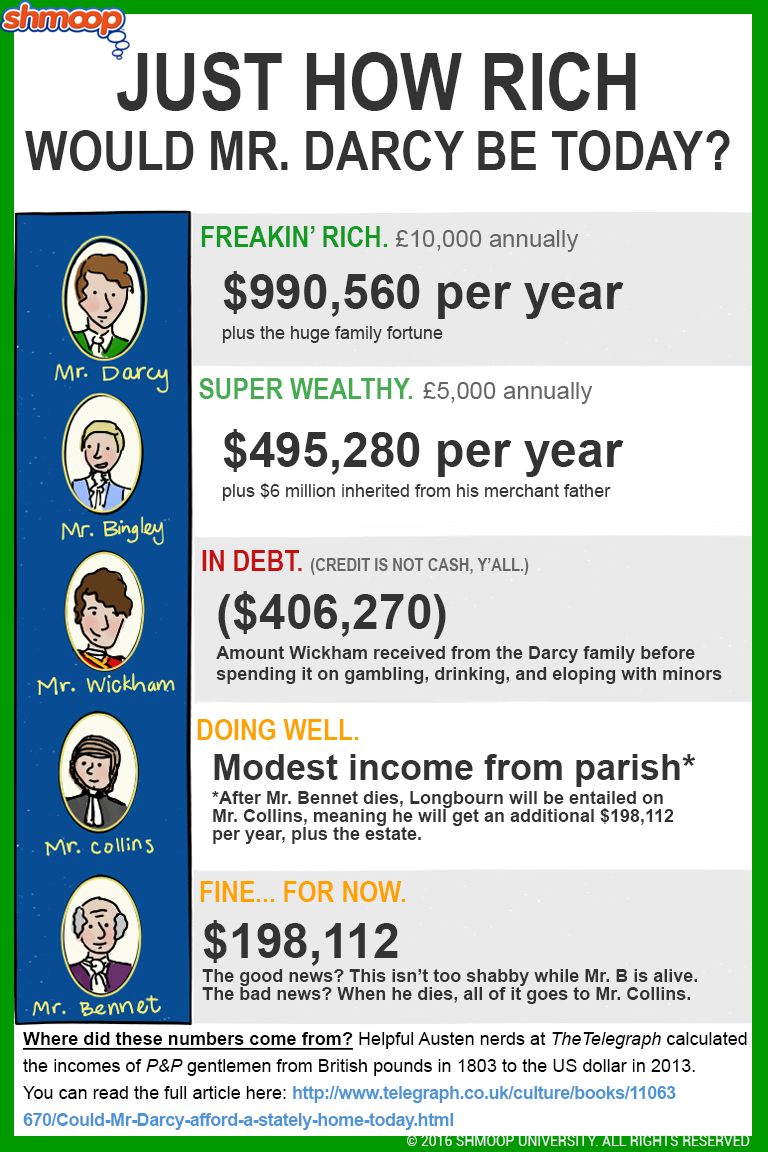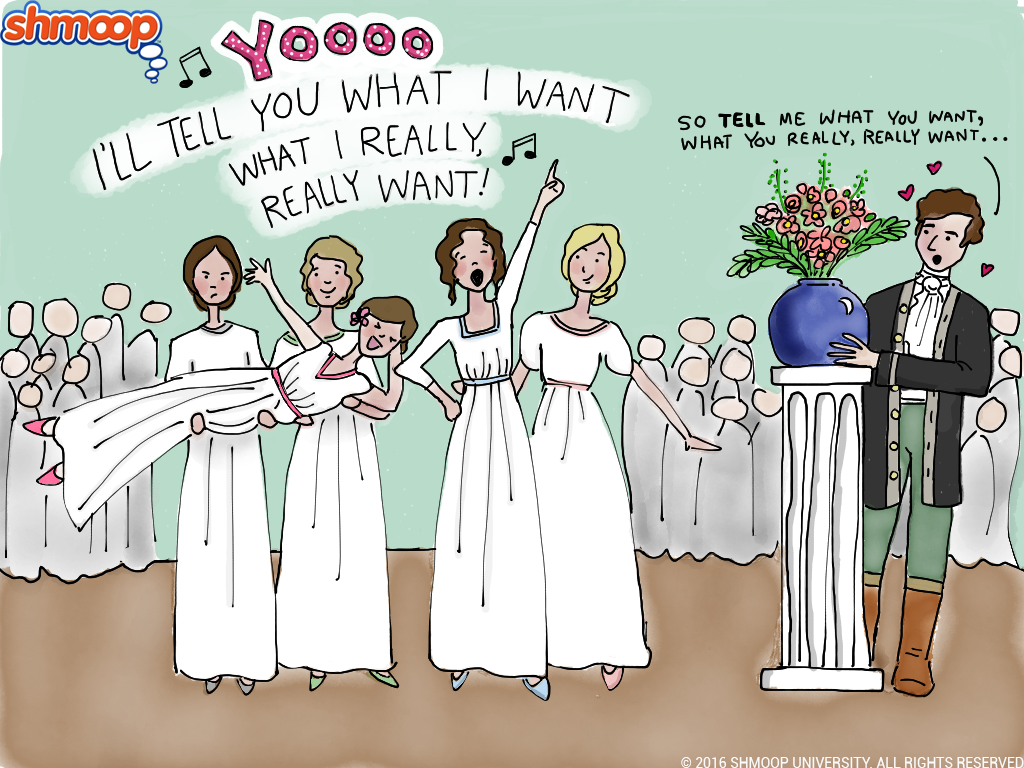Character Analysis

(Click the character infographic to download.)
A haughty landowner, Darcy doesn't see why he should bother with people who aren't as rich, educated, or sophisticated as he is. Still, the ladies love him. Last we checked, Facebook had over 400 groups containing the name "Mr. Darcy." A simple random sample of the titles: "I Refuse to Settle For Anything Less Than Mr. Darcy," "I'm Not Looking for Mr. Right, I'm Looking for Mr. Darcy," "I love Mr. Darcy enough to make Jane Austen uncomfortable."
Wow. Now we're feeling a little uncomfortable. What's the deal with this guy, anyway?
Don't Want No Scrubs
For one, he's rich. There's nothing like whipping out an Amex Black to make the ladies fall in line, are we right? As soon as the people at the Meryton ball hear that he has 10,000 pounds a year (meaning that he's really, really rich), "the gentlemen pronounced him to be a fine figure of a man, the ladies declared he was much handsomer than Mr. Bingley, and he was looked at with great admiration for about half the evening" (3.5). Not to mention that he's tall, good looking, and has a lot of swag—we mean, "a noble mien" (3.5).

(Click the infographic to download.)
No wonder he thinks highly of himself. As he tells Lizzy when she's needling him about being vain, "where there is a real superiority of mind, pride will be always under good regulation" (11.18). Translation: it's not vanity if it's true. With an attitude like that, this guy isn't ready to marry anyone, much less our Lizzy. He gives himself away in his boneheaded first proposal, when he basically says, "Look, I hate your family and you're totally beneath me, but will you marry me?"
Yeah, no wonder she turns him down. So, our question is: what changes? Is the friendly, pleasant Mr. Darcy who meets Lizzy at Pemberley with her aunt and uncle really the same guy glaring at everyone in the room? Did Austen realize halfway through that she'd better make this guy a little more likeable—or does he actually undergo some sort of character transformation?

Gentleman by Birth
While the girls are trying to figure out the whole marriage situation, the Pride and Prejudice boys are fighting their own battle. Except, in their case, the main issue isn't how to catch the right kind of man; it's how to be the right kind of man. Just as Elizabeth clues us into new ideas about marriage, Darcy lets us into new thoughts about just what constitutes a gentleman in a time when the class system is becoming just a little less rigid.
Before social mobility started to become a thing—basically, anytime before the mid-18th century—there was a pretty fixed idea about what a dude's gotta do to be considered part of the "gentleman" ruling class. Basically? Be born into it. You didn't have to walk the walk or talk the talk very much; just carry the right DNA and you were automatically given elite status and considered way more awesome than everyone else.
Eventually, the world started changing. New economic models like mercantilism and capitalism brought in wads of cash that merchants and tradespeople could use to buy stuff like Louis Vuitton bags and beach houses and—oh yeah, big estates, and gradually the word "gentleman" started to apply less to birthright than behavior.
On the one hand, this new definition could be a way of excluding people: to be a true gentleman, you had to think like a gentleman and act like a gentleman, and those qualities couldn't be bought. They had to be learned, usually at really expensive, exclusive schools. On the other hand, they couldn't be bought ... which meant that, potentially, anyone could have them.
Gentleman to Some
As long as he's around his friends and family, Darcy has the gentleman part down pat. He's totally devoted to his sister, he cares about his estate and tenants, and is generally a pretty upstanding member of society. Look at what Lizzy thinks when she hears the Pemberley housekeeper sing his praises:
What praise is more valuable than the praise of an intelligent servant? As a brother, a landlord, a master, she considered how many people's happiness were in his guardianship!—how much of pleasure or pain was it in his power to bestow!—how much of good or evil must be done by him! Every idea that had been brought forward by the housekeeper was favourable to his character. (43.48)
Mr. Darcy is responsible for a lot of people. Remember, he gets all (or a lot) of his money from rents on his land, which means that he's landlord to a huge number of tenants. Then, as now, landlords could be pretty nasty: charging you interest for being a day late, refusing to fix the leak in your bathroom for three months, making you pay for a stain on the carpet that was totally already there when you moved in … (ahem). But not Darcy. Think the 19th century equivalent of a guy who's friendly to his doorman and polite to the waiter. (There's even a trope for that.)
But in public? Let's just say that his outward appearance and manners aren't exactly up to snuff. We can't help but feel like, if we invited Mr. Darcy to our annual Christmas bash, he'd stand in the corner, refuse to speak to anyone, and silently judge our blinking Santa hat. Check out how he's only in town for five minutes before all the Meryton peeps are disgusted with his fussy nonsense: "He was discovered to be proud; to be above his company, and above being pleased; and not all his large estate in Derbyshire could then save him from having a most forbidding, disagreeable countenance, and being unworthy to be compared with his friend" (3.5).

And he knows this, too. When Lizzy needles him about not "practicing" social skill the way she practices the piano, he says, "We neither of us perform to strangers" (32.26). You know people like this. One-on-one, they're hilarious and fun, but stick them in a group of strangers and they get so shy that they come off like the biggest snobs around. (Maybe you're even a little like this, yourself.)
Gentleman to All
What he doesn't know is that "I'm not good with strangers" just isn't enough of an excuse. He needs Lizzy to teach him that. And she does with one key word: "gentlemanlike." After his first proposal, she tells him that she doesn't feel bad about rejecting him, because he hasn't behaved in a "gentlemanlike manner" (34.24). Basically, she's just called him a jerk—except worse. She's said that he isn't a gentleman.
We know that this matters to him because (1) he writes a stinkin' long letter to her to explain exactly why he's not such a bad guy; and (2) he refers to it later. During Proposal #2, he explains that
The recollection of what I then said, of my conduct, my manners, my expressions during the whole of it, is now, and has been many months, inexpressibly painful to me. Your reproof, so well applied, I shall never forget: 'had you behaved in a more gentlemanlike manner.' Those were your words. You know not, you can scarcely conceive, how they have tortured me;—though it was some time, I confess, before I was reasonable enough to allow their justice. (58.14).
Since Darcy isn't our protagonist, we don't actually get to see his character growth in person, the way we do with Lizzy. Instead, we have to take his word for it: when Lizzy told him, essentially, that he wasn't a gentleman, he actually listened—and admitted that she was right. Later in the chapter, he explains his upbringing:
I was taught what was right, but I was not taught to correct my temper. I was given good principles, but left to follow them in pride and conceit. […] I was spoilt by my parents, who, though good themselves […] almost taught me to be selfish and overbearing; to care for none beyond my own family circle; to think meanly of all the rest of the world; to wish at least to think meanly of their sense and worth compared with my own. (58.24)
In other words, his parents encouraged him to think that he was pretty special, and that he didn't need to be, well, a gentleman: he didn't need to be "liberal" in this thoughts—which doesn't, in this context, have anything to do with funding social programs. It means to be generous and open-minded toward other people. As Wickham says earlier to Lizzy, Darcy can be "liberal-minded, just, sincere, rational, honourable, and perhaps agreeable" (16.47), in the right company. Thanks to Lizzy's "lesson"—which Darcy calls "hard indeed at first, but most advantageous," Darcy has been "properly humbled" (58.24). He's learned to be a gentleman to everyone, which means that, just as Elizabeth is ready to make the right marriage choice, Darcy becomes the right marriage partner.
Mr. Darcy's Timeline